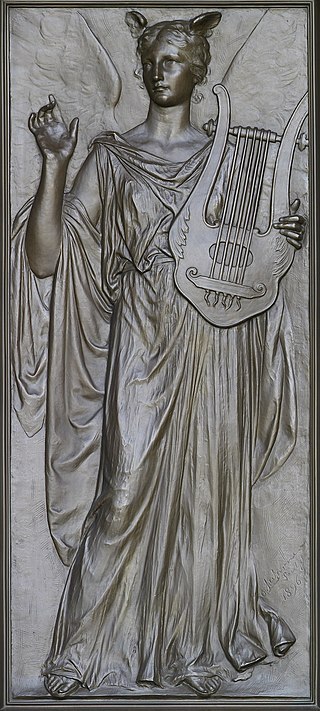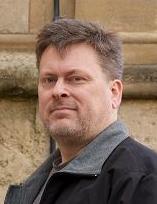
Aristotle was an Ancient Greek philosopher and polymath. His writings cover a broad range of subjects including physics, biology, zoology, metaphysics, logic, ethics, aesthetics, poetry, drama, music, rhetoric, psychology, linguistics, economics, politics, meteorology, geology, and government. As the founder of the Peripatetic school of philosophy in the Lyceum in Athens, he began the wider Aristotelian tradition that followed, which set the groundwork for the development of modern science.
Hylomorphism is a philosophical theory developed by Aristotle, which conceives every physical entity or being (ousia) as a compound of matter (potency) and immaterial form (act), with the generic form as immanently real within the individual. The word is a 19th-century term formed from the Greek words ὕλη hyle, "wood, matter", and μορφή, morphē, "form".
Catharsis is the purification and purgation of emotions through dramatic art, or it may be any extreme emotional state that results in renewal and restoration. In its literal medical sense, it refers to the evacuation of the catamenia—the menstrual fluid or other reproductive material from the patient. But as a metaphor it was originally used by Aristotle in the Poetics, comparing the effects of tragedy on the mind of a spectator to the effect of catharsis on the body.

John Henry McDowell, FBA is a South African philosopher, formerly a fellow of University College, Oxford, and now university professor at the University of Pittsburgh. Although he has written on metaphysics, epistemology, ancient philosophy, and meta-ethics, McDowell's most influential work has been in the philosophy of mind and philosophy of language. McDowell was one of three recipients of the 2010 Andrew W. Mellon Foundation's Distinguished Achievement Award, and is a Fellow of both the American Academy of Arts & Sciences and the British Academy.
Scare quotes are quotation marks that writers place around a word or phrase to signal that they are using it in an ironic, referential, or otherwise non-standard sense. Scare quotes may indicate that the author is using someone else's term, similar to preceding a phrase with the expression "so-called"; they may imply skepticism or disagreement, belief that the words are misused, or that the writer intends a meaning opposite to the words enclosed in quotes. Whether quotation marks are considered scare quotes depends on context because scare quotes are not visually different from actual quotations. The use of scare quotes is highly discouraged in formal or academic writing.

On the Soul is a major treatise written by Aristotle c. 350 BC. His discussion centres on the kinds of souls possessed by different kinds of living things, distinguished by their different operations. Thus plants have the capacity for nourishment and reproduction, the minimum that must be possessed by any kind of living organism. Lower animals have, in addition, the powers of sense-perception and self-motion (action). Humans have all these as well as intellect.
Endoxa is the plural of endoxon, deriving from the word doxa. Plato referred to doxa as the level of apprehension attained when a mind's activity is directed to ta onta or "things" and that the process is independent of perception. Whereas Plato condemned doxa as a starting point from which to attain truth, Aristotle used the term endoxa – in the sense of "commonplace", "everyday", "consensus" – to identify a group or population's beliefs that had previously withstood debate and argument.
The unmoved mover or prime mover is a concept advanced by Aristotle as a primary cause or "mover" of all the motion in the universe. As is implicit in the name, the unmoved mover moves other things, but is not itself moved by any prior action. In Book 12 of his Metaphysics, Aristotle describes the unmoved mover as being perfectly beautiful, indivisible, and contemplating only the perfect contemplation: self-contemplation. He equates this concept also with the active intellect. This Aristotelian concept had its roots in cosmological speculations of the earliest Greek pre-Socratic philosophers and became highly influential and widely drawn upon in medieval philosophy and theology. St. Thomas Aquinas, for example, elaborated on the unmoved mover in the Quinque viae.
The passive intellect, is a term used in philosophy alongside the notion of the active intellect in order to give an account of the operation of the intellect (nous), in accordance with the theory of hylomorphism, as most famously put forward by Aristotle.
Hermotimus of Clazomenae, called by Lucian a Pythagorean, was a philosopher who first proposed, before Anaxagoras the idea of mind being fundamental in the cause of change. He proposed that physical entities are static, while reason causes the change. Sextus Empiricus places him with Hesiod, Parmenides, and Empedocles, as belonging to the class of philosophers who held a dualistic theory of a material and an active principle being together the origin of the universe.

Imagination is the production or simulation of novel objects, sensations, and ideas in the mind without any immediate input of the senses. Stefan Szczelkun characterises it as the forming of experiences in one's mind, which can be re-creations of past experiences, such as vivid memories with imagined changes, or completely invented and possibly fantastic scenes. Imagination helps make knowledge applicable in solving problems and is fundamental to integrating experience and the learning process. As an approach to build theory, it is called "disciplined imagination". A basic training for imagination is listening to storytelling (narrative), in which the exactness of the chosen words is the fundamental factor to "evoke worlds".

Myles Fredric Burnyeat was an English scholar of ancient philosophy.
John Herman Randall Jr. was an American philosopher, New Thought author, and educator.
Aristotle of Stagira was a Greek philosopher.
Christopher John Fardo Williams was a British philosopher. His areas of interest were philosophical logic, on which topic he did most of his original work, and ancient philosophy, as an editor and translator.

Edward Charles Feser is an American Catholic philosopher. He is an Associate Professor of Philosophy at Pasadena City College in Pasadena, California.
Anthony William Price is Emeritus Professor of Philosophy at Birkbeck College, University of London where he taught philosophy from 1995 until 2016. His research relates to Greek ethics and moral psychology, and contemporary ethics. Price was educated at Winchester College and the University of Oxford. He taught at the University of York from 1972 to 1995.
Barbara Michaela Sattler is a Senior Lecturer in philosophy at St Andrews University. Her area of research is metaphysics and natural philosophy in the ancient Greek world.
Ursula Charlotte Macgillivray Coope FBA is a British classical scholar, who is an expert in the study of the ancient Greek philosopher Aristotle's physics, metaphysics, and ethics, as well as on Neoplatonism. She is Professor of Ancient Philosophy at the University of Oxford.
Christopher Shields is an American philosopher and George N. Shuster Professor of Philosophy at the University of Notre Dame. He is the editor of Notre Dame Philosophical Reviews.





